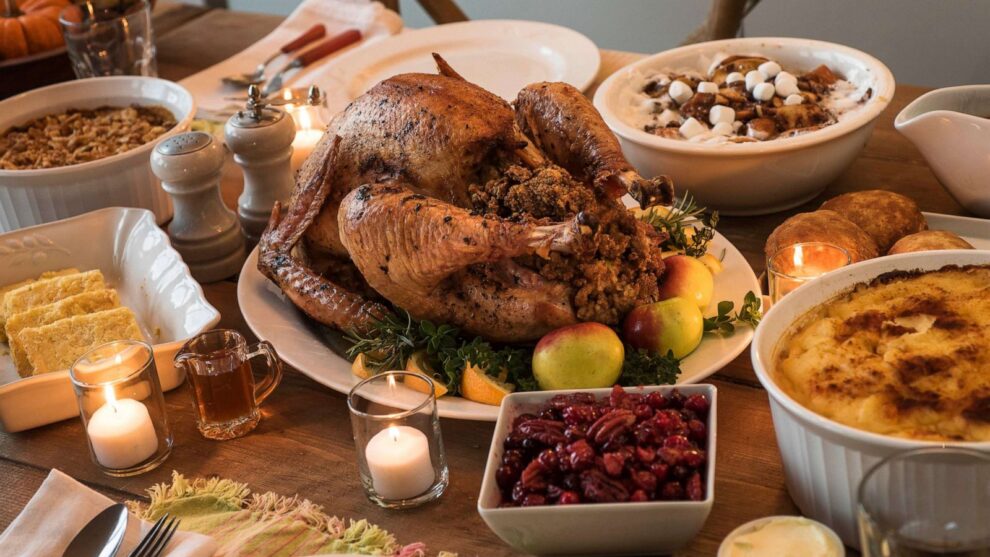During Thanksgiving, food takes center stage.
But for those who struggle with food anxiety, the collective focus on eating can be a stressful time.
For some people, eating situations or discussion around food brings about “stress” or “discomfort,” explains Lexi Moriarty, MS, RDN, a certified sports dietitian at Fueled + Balanced Nutrition.
There can be a number of potential triggers: Talking about grocery shopping, making food, eating a meal prepared by someone else or the thought of larger-than-usual food portions can well up feelings of anxiety, she says.
“Food anxiety can take away from the experience, memories and social aspect of any meal,” Moriarty tells The Messenger via email. “It can cause someone to overthink what they’re eating, feel guilty about certain food choices and make it hard for them to focus on the social experience.”
If you have food anxiety, here are some tips for navigating Thanksgiving so you can enjoy time with family and friends.
The source of food anxiety can stem from many, many things, whether it’s a history of disordered eating or a severe food allergy.
In another scenario, maybe eating a meal that was prepared by someone else that doesn’t align with your “food rules” could push you far beyond your comfort zone, Moriarty says.
But this doesn’t mean you should skip attending festivities. Moriarty says that there are many ways to work around the inevitable triggers. One surefire way, she says, is planning ahead.
Coordinating days, or maybe even weeks ahead, with whoever is hosting the dinner could be the most direct way to smooth out potential issues.
“It’s helpful to make the host aware so they can be sure that safe options are available to you,” says Moriarty.
Stick to your regular eating routine
Holiday meals, Moriarty notes, don’t have to be any different from other meals you might normally eat. Basically, aim to eat as you usually would.
“Try to fill your plate with options that feel a bit safer, like proteins and veggies,” Moriarty suggests.
If you’re worried about missing out on key nutrients from some of the more decadent foods typically served during holiday festivities, another strategy could be to eat your regular meal right before heading to dinner.
This approach could help you stick to your nutrition goals and needs, even if you’re uncomfortable with some of the more indulgent options at the table.
“Nourishing yourself throughout the day will also help you avoid ‘catch-up eating’ and feeling out of control around foods you don’t usually eat,” Moriarty says. “When you feel that you’re able to enjoy all foods without ‘overdoing it,’ and eat within your hunger fullness cues, it can help lessen food anxiety.”
Most importantly, if you have an eating disorder, it is best not to save up so-called “unused calories” for the day so that you can “make up for it” by eating a large holiday meal. This could leave you feeling more hungry and more likely to feel bad about any additional food you might consume. Instead, Moriarty suggests eating small snacks throughout the day to offset an emotional reaction.

Establish boundaries on diet talk
Although holiday gatherings are typically joyous gatherings, they can also be a hotbed for corrosive food-focused conversations and “diet talk,” as Moriarty calls it, which can stir up a problematic environment that can compound stressors for people who have complicated emotional ties with food.
Think: The aunt who says she’ll have to hit the gym twice as hard to “burn off” all the calories from her pumpkin pie; the cousin who’s always sharing details of a new fad diet; or maybe just the nosy relative remarking that you look “thin” or asking for “your secret.”
Talk of burning excess calories, comments about how much or how little someone eats, post-holiday diet or exercise plans or remarks about someone’s appearance can be tough to hear.
“These types of conversations are normalized in our society and often common around the holiday table,” Moriarty points out. “[It] can feel triggering for someone with food anxiety.”
Instead of being dragged down by such comments, according to the experts The Messenger spoke to, it may help to set firm boundaries before the event.
This might mean speaking with the host or other relatives who might attend. Ask them politely to refrain from negative comments or diet talk, or enlist help from reliable relatives to steer the conversation to more agreeable topics or change the subject.
If this doesn’t work, experts recommend you give yourself permission to simply get up and leave the table.
Cut yourself some slack
It’s okay to consume food and drinks you might not otherwise, especially during the holiday season. And no, despite common beliefs that an average American gains around five pounds between Thanksgiving and New Year’s Day, research shows that’s simply not true.
On the contrary, findings show most people are unlikely to gain more than one pound at most.
“We are allowed to consume food and drinks simply because we enjoy them even when they don’t directly contribute to our physical health,” Moriarty says. “Every calorie that we consume does not need to be nutritious.”
In fact, it’s more than okay to make exceptions once in a while, especially for special occasions.
“Living in the moment and enjoying holiday meals can have a significant positive impact on our social health, mental health, resilience and ability to manage stress,” she says.
Source : The Messenger












Add Comment